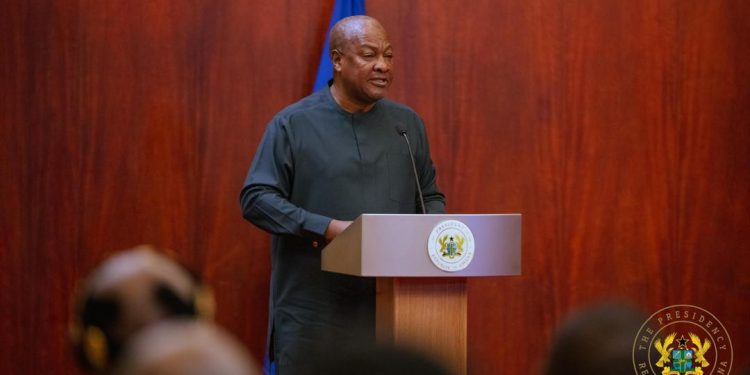President John Dramani Mahama has assured the newly sworn-in Governor and Deputy Governor of the Bank of Ghana (BoG) that his administration will prioritize fiscal responsibility and will not resort to reckless money printing to fund government expenditure.
During the swearing-in ceremony of Dr. Johnson Asiama and Dr. Zakaria Mumuni at the Jubilee House, Mahama emphasized the dangers of excessive and unregulated central bank financing, which, he said, has negatively impacted Ghana’s economy in recent years.
“When the government relies on unsustainable consumption and finances it through the excessive printing of money, the consequences can be severe. From rampant inflation to the erosion of incomes and pushing millions into poverty, these actions damage public trust in financial institutions and threaten long-term stability,” Mahama warned.
He further assured the newly appointed BoG officials, stating, “One thing for sure, I’m not going to come and ask you to print more money.”
Mahama’s comments come amid growing concerns regarding Ghana’s economic management, particularly the Bank of Ghana’s role in financing budget deficits through money printing. This has been linked to rising inflation, a depreciating currency, and reduced purchasing power for citizens.
Economist Prof. Godfred Bokpin has also attributed Ghana’s inflationary issues to the excessive printing of money by the central bank and the government’s failure to adequately invest in productive sectors. On a recent TV interview, he highlighted that the injection of excess liquidity, particularly in 2022, played a significant role in escalating inflation.
“If you look at Ghana and the injection of excess liquidity, at some point, the Central Bank even denied it. In 2022, the Domestic Debt Exchange showed GH¢77.6 billion in overdraft lending to the government. What do you expect?” Prof. Bokpin questioned.
According to Prof. Bokpin, Ghana’s persistent inflation is primarily driven by unchecked money printing rather than actual economic productivity.


